Introduction and Hosts' Background
00:00:12
Speaker
Welcome to Clued in Mystery. I'm Sarah. And I'm Brooke, and we both love mystery. Hi Brooke. Hi Sarah, I'm looking forward to continuing our Modern Greats series today.
Ruth Rendell's Influence on Crime Fiction
00:00:28
Speaker
We're going to be talking about Ruth Rendell or Rendell, and we can talk about how her name might be pronounced, um who is credited with really starting the psychological thriller in crime fiction. I'll begin with a little bio.
Rendell's Early Life and Career
00:00:49
Speaker
Ruth Rendell was born in 1930 in Essex as the only child of a pair of teachers. She married at 20, having met her husband while they were both working as reporters, though the pair parted ways for a brief time in the 1970s. They eventually remarried. While she was raising their son, Rendell started writing mysteries. Her first book was published in 1964, and she would go on to publish over 70 novels under her own name and under the pen name Barbara Vine.
00:01:19
Speaker
Similar to other authors who release work under multiple names, there was a difference between what the two personas wrote. As Rendell, she focused on detective fiction and thrillers. As Vine, her tales were darker and slower, often exploring the story from the killer's point of view. Whether she was writing as Rendell or Vine, she didn't shy away from exploring the impact of social issues. In addition to her novels, she also published several short stories and saw many of her works adapted for television or translated.
Achievements and Style Comparisons
00:01:49
Speaker
At the time of her death, over 60 million copies of her books had been sold. Rendell won her first awards in 1975, won from the Mystery Writers of America for a short story, and won from something called Current Crime for a novel, and I couldn't find any more information about that.
00:02:07
Speaker
From then on, she won several awards, including the Diamond Dagger for Lifetime Achievement from the Crime Writers of America in 1991, the Mystery Writers of America Grandmaster Award in 1997, and the Mystery Inc. Gumshoe Award for Lifetime Achievement in 2004.
00:02:25
Speaker
In 1996, she was honored as a commander of the British Empire and in 1997, she was named Baroness Rendell of Babur and made a life peer in the House of Lords. In her political life, as in her writing one, she focused on social issues. Rendell died in 2015 following a stroke.
00:02:45
Speaker
Thanks, Sarah. um So let's talk about her name for just a minute because we have seen, I'll i'll admit like anytime I've read it or I've you know seen her books in my head, it's been Rendell, like Janelle or Pharrell. But um I was watching an interview on YouTube and the interviewer referred to her as Rendell. And so you and I looked into it and we've seen it both ways.
00:03:11
Speaker
That's right. Yeah, I've i've seen where I heard a couple of interviews where ah it was Rendell and others where it's Rendell and the audio book that I listened to, it was Rendell. So I don't know, maybe she was fine with either pronunciation. Exactly. Well, thank you for the summary. I think that her early life is really interesting that she was a news writer, she was a reporter,
00:03:39
Speaker
And we've seen that before, um, Anthony Berkeley, who's of course, one of the golden age authors was also a reporter before turning to fiction crime author. But I found it interesting because with Berkeley, I remember you and I talked about how you could really see in his writing style, the influence of news writing. And with Rendell, I feel like it's sort of the opposite.
Unique Writing Approach and Success
00:04:07
Speaker
beautiful and almost literary style. Yeah, i would I would definitely agree that her style is literary. In several of the bios that I read about her, there was reference to a story where, as a reporter, she filed a story about, um I think it was a tennis club meeting, ah that she actually didn't go to, but the main speaker at the event died on stage, and that obviously wasn't in the story that she had filed, and so she ended up leaving the publication.
00:04:40
Speaker
as a result. And and it it appeared almost every um kind of summary of her life that that I looked at. And I thought it was really interesting because in a couple of other places, I saw reference to the fact that she didn't do a lot of research. So clearly this was something that was true throughout her life.
00:05:04
Speaker
Interesting. Yes, I came across that story as well and found it really humorous. um ah As someone who intended, I fully intended to become a journalist, a reporter. That's where I thought my writing would take me someday. And um I cringed because I thought, oh, dear, you reported on it, but you didn't attend. But you know maybe that's something that she had had gotten good at and you know had pulled off in the past. So good for her, I guess.
00:05:34
Speaker
Yeah. And I mean, anyway, it it it is probably good that she didn't continue in that career because she did end up then writing fiction. And yeah, her first book was published in 1964. She earned a some of 75 pounds, I believe it was for that first novel. And obviously there would have been some sales. She would have earned some money as a result of that. But I i think it's really interesting that she had a very humble beginning to her career. And by the time she died, she was fantastically successful.
00:06:14
Speaker
Exactly. And you know you mentioned those awards. She actually is still, I believe, the record holder for the most awards in crime fiction. So not only financially successful, but also like with her peers and acclaimed crime fiction author.
Exploration of Crime Elements and Psychological Motives
00:06:35
Speaker
That first book that she published introduced her series detective Reginald Wexford. But I thought it was really interesting that the next two books that she published were standalone novels. So it wasn't until her fourth book that another in her Wexford series was published. And throughout her career, she alternated one or two standalones with one or two series novels. And interspersed in there were some short story collections.
00:07:03
Speaker
So i I just think it's really interesting that she, from the very beginning, wanted to explore different elements of crime writing. Yeah, I didn't realize that. i I find that interesting as well. And I wonder if it is partly because in interviews, she will discuss how she wasn't necessarily interested in doing the very traditional whodunit kind of story. I mean, she did start with this detective and that in a sense
00:07:35
Speaker
you know, dictates that you're going to have a ah somewhat of a whodunit. But she really liked the why and the motives behind. And so maybe that going back and forth between different types of stories um was a way to keep her creativity going so that she could investigate, you know, different things and not have to be that puzzle mystery, so to speak.
00:07:57
Speaker
Yeah, i I think that's true. And I think I read in one of the articles about her, it talks about how she didn't want kind of a tired detective. And she actually ah it talks about how his qualities are, she shares a lot of traits with her detective, right? They read the same kinds of things. They enjoy the same kinds of activities.
00:08:25
Speaker
She inserted herself a lot into her detective. Yes. I, I enjoyed learning that because I think many times we hear the opposite. Somebody will interview an author and say, you know, is your character based on anyone? And they'll say, Oh no, I just, you know, I don't, I don't do that. It's an amalgamation. Um, but she did say that Wexford is like a male version of herself and, uh, her opinions than are shared on the page by Wexford. And I i felt that was really interesting. And probably more honest than a lot of people are, right? For sure. So one of the things, Brooke, about Randell is that she's kind of credited with really creating the psychological suspense subgenre. Right. and it's a
00:09:21
Speaker
It's a marriage, isn't it, of both the detective novel and and that component because um it's not just a domestic thriller. She does have the investigation, at least in the Wexford series going on. you know i I heard her speak about how she was feeling that you know in the in the late 60s, we still have Agatha Christie novels coming out and they were still quite similar to the same style that Christy had written. And Rendell really felt like that idea of like the locked room or the small circle had run its course. She felt that it was stale and kind of done. And so I think that um encouraged her to carry on crime fiction, but, you know, take it into something a little bit more modern and a little bit more um personal, maybe. Mm hmm. Mm hmm.
00:10:19
Speaker
The other thing that I think she really tried to avoid was that what we think of as in traditional mysteries, you know, the small town and all of the people dying all around the place. ah She was not a fan of Agatha Christie.
00:10:35
Speaker
No, not at all. Actually in a New York Times 1995 article, she says, I don't like Agatha Christie. She wrote very badly. Her characters are not real. And they are repeated over and over. Although I will acknowledge that she has the most wonderful ideas. um But I think that the problem comes back to what you said. It's more of the the cozy mystery setup that she is not a fan of.
00:11:03
Speaker
She didn't like there being a kind of haphazard, um you know, the niece suddenly decides to kill her rich uncle because it comes back to what we said before that she wants there to be a why and a an underlying psychological motive.
00:11:19
Speaker
Yeah, absolutely. I think she, as you said before, is really, she was really focused on the reason behind the crimes. And I think that's what allowed her to write her tails more slowly, right? Like to unravel her tails more slowly um because she's exploring that, right? It's not action, action, action, action. It's you're really in the heads of these characters.
00:11:53
Speaker
Exactly, yeah. um In that same um YouTube interview that I watched, she says that. She says, oh, I'm terrible about with the action scenes. It's just that where her strength lies, she wants to be, as you say, in their heads. And I think that her ability to do that just makes her stories very captivating. like You really want to turn the page.
00:12:18
Speaker
So did you read any of the bar Barbara Vine works that she wrote? I didn't. All
Public Persona and Writing Routine
00:12:26
Speaker
I read to prepare so far is um in the US s it's titled Death Notes and um it's in the UK. That one is titled Put On By Cunning.
00:12:35
Speaker
And it's a 1981 Wexford novel, so right smack dab in the middle of that series. um Did you read any Barbara Vine? I started reading um the first one, which is A Dark Adapted Eye.
00:12:52
Speaker
And in it, so she talks about, I think from the beginning, she was very open about Barbara Vine being her pen name, right? It wasn't something that she was keeping secret. And in it, she wrote, for a long time, I have wanted Barbara to have a voice as well as Ruth. It would be a softer voice speaking at a slower pace, more sensitive perhaps, and more intuitive.
00:13:20
Speaker
In a dark, adapted eye, she found that voice. There would be nothing surprising to a psychologist in Barbara's choosing as she asserts herself to address readers in the first person. And apparently, um her mother's side of the family called her Barbara because Barbara was her mother's choice of name for her. Ruth was her father's choice. And so she, for her entire life, kind of had these two personas.
00:13:48
Speaker
Oh, that's fascinating. Yes, it was actually her her middle name, her second name, Barbara. Um, but I didn't realize that certain members of her family actually called her that. That's so interesting. And she did say, you know, those books are very different. She admits that the voice is very different from one name to the other. And that just simply by knowing that she was working on a Barbara vine book, that it would happen. She almost like kind of became that other identity to write those books.
00:14:18
Speaker
In the different um interviews or ah articles that we've read, I really got the picture that this was a very um reticent, kind of cool, elegant woman. You know, maybe even a little prickly, like with interviewers and um and the public in general, which is maybe why there's not. For some people, you can just find lots and lots of information. And and it was a pretty small menu to choose from for Ruth Rendell.
00:14:46
Speaker
Yeah, i I would agree. Given how popular her writing is, there really wasn't a lot that has been written about her. um So I think you're right. I think she was a little hesitant to um give interviews. I did see her reading from her but But yeah, i think just I think she appreciated being a private person. There was one interview that I read where she talks about that you know she doesn't really get recognized on the street and she's quite fine with that. Well, whether she would appreciate this or not, that is something she shared with Agatha Christie, who also wanted to just be private and and not have a ah big public persona.
00:15:37
Speaker
i I liked learning and it seems to go along with the personality traits we were just talking about that she had a very specific um writing schedule. She would start writing at the same time every day and end at the same time every day. um and and I think that that's a little unique to her as well from compared to some of the other people that we've chatted about.
00:16:03
Speaker
Oh, that's interesting. I didn't uncover that. So that is um that is really interesting. What time of day did she start writing? ah She did not share that. She said she said that she also ate the same things every day whenever she was at home and she would walk 11 miles a week.
00:16:21
Speaker
So I did read that she spent a lot of time walking and I think that was, and we've seen this before when we've talked about other authors, that was her opportunity to kind of really turn over the story, right? um was Was while she was walking.
00:16:41
Speaker
Absolutely. And also, um you know, observe the world because that's something else that I think her writing because she does you know get so deep into someone's psyche, she really understood people and relationships. And um she was definitely, I think, a people watcher when she was out there walking.
00:17:02
Speaker
hu She didn't have any formal umm training and you know she started working as a reporter after high school. So she didn't go to university or college. And so I think it's really remarkable the way that she just had that ability to understand people. Yeah, that's an excellent point. I i hadn't put that together, but you're right. She didn't have any education after after high school. um Yeah, that's that's amazing. How about adaptations,
Adaptations and Literary Debate
00:17:34
Speaker
Sarah? I know that some of her work has been brought to the screen. There was a series that was produced called Ruth Rendell Mysteries, and several of the Wexford stories were televised, as well as several of the stand-alones. And there I found them on Britbox.
00:17:56
Speaker
and watched one of each, one of the standalones and one of the Wexford stories. And I enjoyed them. And yeah, I mean, they were done in the, I'd say the late 90s. I think were very popular at the time that they were released on on TV.
00:18:15
Speaker
So in one thing I read, Sarah, it was this interviewer was posing that her novels aren't crime fiction novels at all. They're literary novels that happen to have crimes in them. but Where do you fall on that? Where do you think they they are on the spectrum? So I would probably agree if we're not talking about the Wexford novels, right? Because i I think those, I read a couple of those and they follow what we would consider the traditional kind of detective um sequence of events, right? There's a crime, the detectives are called in, they interview people, they solve it.
00:19:05
Speaker
But I read The Master of the Moor, which is one, it it is not a Vine novel, but it was written shortly before she published her first Vine novel. And so, like, I think it probably could have been a Vine novel because it was really, really slow. You're in the the mind of the um of the killer, but it takes a long time to get there. And it was, I mean, beautiful descriptions of setting and and really interesting to think about kind of how this character interacted with people. um But it wasn't, it definitely wasn't like a lot of the other books that we read under the mystery umbrella.
00:19:57
Speaker
Yeah, very interesting. and Having only read a Wexford, in my opinion, they are crime they are crime novels, but with a very literary feel for sure. and The other author that came to mind that's maybe our contemporary ah compatible author is Louise Penny. I feel like those, ah those novels are very similar because you still are are in a detective story, but just very beautiful and a little slower paced and a lot of description.
Suspense Techniques and Hosts' Reflections
00:20:32
Speaker
Yeah. So in this one interview that I read, she talks about creating suspense.
00:20:38
Speaker
I think one looks at great fiction and sees how that is done. Think about Emma, she says. We know there is something strange about Jane Fairfax, but it's not until very far on that we realize that all the time she's been engaged to Frank Churchill. It's done in masterly fashion. There's nothing clumsy about it. Nothing appears to be contrived, and it's done by withholding. Some new writers will tell you everything in the first chapter. Everything is thrown in, and so there's nothing to wonder about, nothing to speculate about.
00:21:06
Speaker
That said, a lot of her opening lines were telling you exactly what's going to happen and then taking the whole book to get to that point.
00:21:18
Speaker
Yes, actually that thought came to me as soon as you read that quote, I was like, oh my goodness, but I can think of some examples where she does that. ah But I think that it's withholding just enough to create that suspense. And i like I love the word speculation because that's something that we want to do, right? When we're reading, i I find myself, well, maybe it's this, well, maybe it's that. And that's that feeling that keeps you pushing forward.
00:21:45
Speaker
Yeah, she was really interesting to learn about. um She's one of those authors that I had not read any of her work, despite her being incredibly popular.
00:21:57
Speaker
And that was the same for me. i'm I'm actually surprised. And as I read this story, I thought, you know, this is the era of detective novels that I really came up on the eighties and nineties is when I really started reading a lot of it. And I'm surprised and happy that I've finally read some Ruth Rendell and, um, we'll probably check out the Barbara vine as well.
00:22:21
Speaker
Well, thanks for this conversation, Brooke. It's been really fascinating to discuss someone who is, you know, one of the, not the pioneer, but certainly a leader in crime writing. It was great, Sarah. Thank you for another wonderful conversation and thank you all for joining us today on Clued In Mystery. I'm Brooke. And I'm Sarah, and we both love mystery.
Episode Conclusion and Call to Action
00:22:50
Speaker
Clued In Mystery is written and produced by Brooke Peterson and Sarah M. Stephen. Music is by Shane Ivers. If you liked what you heard, please consider telling a friend, leaving a review, or subscribing with your favorite podcast listening app. Visit our website at cluedinmystery.com to sign up for our newsletter, The Clued In Chronicle, or to join our paid membership, The Clued In Cartel. We're on social media at Clued In Mystery.

![[Bonus] Wake Up Dead Man image](https://media.zencastr.com/cdn-cgi/image/width=112,quality=85/image-files/61e1c276e3ec42007857cff9/e276ac32-e664-464f-956c-7699bdb60aa5.jpg)
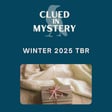
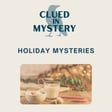
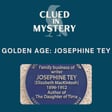
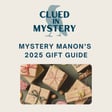
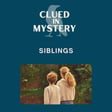

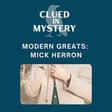
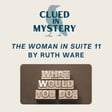
![[Bonus] Read Along: Daughter of Time image](https://media.zencastr.com/cdn-cgi/image/width=112,quality=85/image-files/61e1c276e3ec42007857cff9/b953ad72-c43e-48ca-a18a-b3c216ab90ee.jpg)
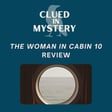
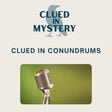
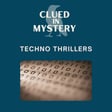
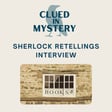
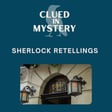
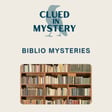
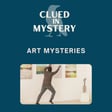

![[Bonus] Thursday Murder Club preview image](https://media.zencastr.com/cdn-cgi/image/width=112,quality=85/image-files/61e1c276e3ec42007857cff9/e51be644-e446-4d32-b89c-12bfc60d30e9.jpg)
![[Re-release] Hallmark Mysteries and More (part 2) image](https://media.zencastr.com/cdn-cgi/image/width=112,quality=85/image-files/61e1c276e3ec42007857cff9/edbc4a22-ebb8-42cb-b211-1f94f4cb920f.jpg)